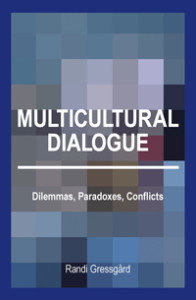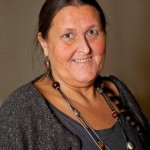 As cross-cultural migration increases democratic states face a particular challenge: how to grant equal rights and dignity to individuals while recognizing cultural distinctiveness. In response to the greater number of ethnic and religious minority groups, state policies seem to focus on managing cultural differences through planned pluralism. This book explores the dilemmas, paradoxes, and conflicts that emerge when differences are managed within this conceptual framework. After a critical investigation of the perceived logic of identity, indicative of Western nation-states and at the root of their pluralistic intentions, the author takes issue with both universalist notions of equality and cultural relativist notions of distinctiveness. However, without identity is it possible to participate in dialogue and form communities? Is there a way out of this impasse? The book argues in favor of communities based on nonidentitarian difference, developed and maintained through open and critical dialogue.
As cross-cultural migration increases democratic states face a particular challenge: how to grant equal rights and dignity to individuals while recognizing cultural distinctiveness. In response to the greater number of ethnic and religious minority groups, state policies seem to focus on managing cultural differences through planned pluralism. This book explores the dilemmas, paradoxes, and conflicts that emerge when differences are managed within this conceptual framework. After a critical investigation of the perceived logic of identity, indicative of Western nation-states and at the root of their pluralistic intentions, the author takes issue with both universalist notions of equality and cultural relativist notions of distinctiveness. However, without identity is it possible to participate in dialogue and form communities? Is there a way out of this impasse? The book argues in favor of communities based on nonidentitarian difference, developed and maintained through open and critical dialogue.
Randi Gressgård is a Senior Researcher at the Centre for Women’s and Gender Research (SKOK) at the University of Bergen. She is also affiliated with the research unit International Migration and Ethnic Relations (IMER) in Bergen. Her research interests focus on minority research, gender studies, and philosophy of science. Her publications include Fra identitet til forskjell [From Identity to Difference] (Spartacus/Scandinavian Academic Press, 2005) and Kjønnsteori[Gender Theory] (co-ed., Gyldendal Akademisk, 2008). Read more…
Religious traditions and muslim youth in europe
Christine M. Jacobsen (UiB/Uni Rokkansenteret)
Jonas Otterbeck (University of Lund)
Synnøve Bendixsen (SKOK/Uni Rokkansenteret)
A major question regarding Islam in Europe concerns the religiosity of “Muslim youth” – a category currently epitomizing both the fears and hopes of multicultural Europe. At this seminar, researchers working in 3 European countries look at how Islamic traditions are engaged and reworked by young people, born and educated in European societies, and discuss the modes of religiosity that are shaped in a context of international migration, globalization, and secular modernity.
Christine M. Jacobsen launches her new book Islamic Traditions and Muslim youth in Norway in conversation with Jonas Otterbeck, the author of Samtidsislam: unga muslimer i Malmö och Köpenhamn and Synnøve Bendixsen, the author of “It’s like doing SMS to Allah” Young Female Muslims Crafting a Religious Self in Berlin.
Seminar and book launch.
Organised in collaboration with Department of Social Anthropology, UiB.
Time: Friday 21 January, 13.15-16.00.
Venue: Uni Rokkansenteret, Nygårdsgaten 5, 6. etg (5th Floor)
«Mobilitet, moral og migrasjon: familisme – begrepet i norske og italienske kontekster.»
Seminaret tar for seg hvordan middelhavslandenes familisme – begrep konstrueres og erfares i migrasjons-kontekster blant nordmenn i Italia og italienere i Norge. Dagens familisme utfordres både av «post-moderne” endringer i familie-strukturen, slik som lav fertilitet og stigende skilsmisse-rater, og av finanskrise og migrasjon.I Sør-Europa eksisterer lav fertilitet side om side med tradisjonelle omsorgs-organiseringer og parallelt med kontant-tunge velferdsprogrammer og begrenset produksjon av tjenester for de unge og de eldre. Den sentrale oppfatningen i komparative studier av relasjonen mellom familie og velferd er at velferdsstatene baserer politikken på en «tatt-for-gitt» holdning til en kjønnstradisjonell familie-institusjon, og denne kulturelle forutsetningen sementerer de tradisjonelle familie-strukturene. Men i hvilken grad er familiestrukturer og kulturelle og sosiale normer og verdier bundet sammen med idealtypiske regimer og nye migrasjonsmønstre?Nyere forskning viser til at sør-europeiske kvinner drømmer om den nordiske velferdsstaten eller en stat som organiserer familie -og arbeidsbalansen bedre. De vil ha tilgang på flere og bedre offentlige omsorgstjenester. Nordiske velferdsstater framstår som reneste paradiser for kvinner i Italia, og definitivt som et ideal, hevder samfunnsforskere. På den andre siden ser vi at mens italienere drømmer om velferd og arbeid, drømmer nordmenn om mer familieliv. En av de norske informantene i mitt prosjekt sier at hennes drøm er «å få til et italiensk familieliv kombinert med et norsk arbeidsliv». Hvordan er forbindelsen mellom familie-strukturer og familie-verdier? Hvordan er de relatert til mobilitet, moral og migrasjon?
 Lise Widding Isaksen er professor i sosiologi på Universitetet i Bergen. Hun jobber for tiden med prosjektene 1) «Mobilitet, moral og migrasjon: en studie av familiekulturer i Norge og Italia» , 2) «Polish Female Migrants and Their Families: A Study of Care Deficits» og 3) «Welfare Models, Demographic Patterns and Family Strategies in the Context of the Financial Crisis in Spain»
Lise Widding Isaksen er professor i sosiologi på Universitetet i Bergen. Hun jobber for tiden med prosjektene 1) «Mobilitet, moral og migrasjon: en studie av familiekulturer i Norge og Italia» , 2) «Polish Female Migrants and Their Families: A Study of Care Deficits» og 3) «Welfare Models, Demographic Patterns and Family Strategies in the Context of the Financial Crisis in Spain»
Siste publikasjoner:
Lise Widding Isaksen, 2010 (ed): Global Care Work. Gender and Migration in Nordic Societies. Nordic Academic Press, Lund, Sverige
Lise Widding Isaksen (2012) “Transnational Spaces of Care: Migrant Nurses in Norway.” In Social Politics, International Studies in Gender, State and Society, vol. 19, number 1, spring 2012, p.58-78, Oxford University Press, Oxford
“Children Left Behind” i samarbeid med Uma Devi og Arlie R. Hochschild i Hochschild, Arlie R., 2013: «So How’s the Family» and other essays», University of California Press, Berkeley
Communicating Migration Seminar Series IMER Bergen spring and autumn 2014
The IMER seminar series for 2014 will cover how migration and ethnic relations are communicated in every-day encounters, in mass and social media, in politics and in teaching at the universities. Has the way people talk about migration and migrants in different social contexts changed over time, and in which ways has it changed? How does migration theory and research fit in with other topics and theories in the social sciences, and how do results from migration research inform public debate and policy development? Communicating migration will be discussed from various angles in our seminar series on international migration and ethnic relations during spring and autumn 2014. We welcome papers that touch upon this broad theme from different angles. Historical analyses of change over time in regard to politics and public debate, research foci and disciplinary concerns are specifically welcomed. The seminar series will end with a two-day conference in October/November 2014.
The Children of the Revolution: Reflections on Chinese London and how to Theorise these New Forms of Migration
This paper explores some of the London data from a three-city investigation of migration. The other two cities are Beijing and Hong Kong, and in each city we are exploring young (23-39) graduate migrants from the other two cities in order to understand how global mobility features in young professionals’ life and career planning. Little has been written about UK migrants in Hong Kong and Beijing, and the existing literature on Chinese migrants in London is centred on long-term (often depicted as poor and illegal) migrants from Hong Kong. Such studies do not begin to capture the lives of the new young migrants, many of whom are from Mainland Chinese cities, who must navigate new border restrictions favouring the wealthy and the highly talented. The paper will explore some of the challenges to existing migration theory these young urban migrants pose.
Caroline Knowles
 Caroline Knowles is Professor of Sociology and former director of the Centre for Urban and Community Research (CUCR) at Goldsmiths, University of London. She is known for her work with artists and photographers exploring the intersections between art and sociology in urban social research. Following her interest in materials and translocality she has just completed the biography of a pair of flip-flop sandals funded by the Leverhulme Trust with Singapore artist Michael Tan. Flip-Flop: A Journey Through Globalisation’s Backroads will be published in May by Pluto Press. Following her interests in migration she is also currently researching the Beijing, London, Hong Kong circuit travelled by young migrants in these three cities in collaboration with Ho Wing Chung at the City University of Hong Kong. She is the author of many books and papers on cities, ethnicity, migration and mobilities including Hong Kong: Migrant Lives, Landscapes and Journeys (2009) University of Chicago Press with US photographer and Sociologist Douglas Harper.
Caroline Knowles is Professor of Sociology and former director of the Centre for Urban and Community Research (CUCR) at Goldsmiths, University of London. She is known for her work with artists and photographers exploring the intersections between art and sociology in urban social research. Following her interest in materials and translocality she has just completed the biography of a pair of flip-flop sandals funded by the Leverhulme Trust with Singapore artist Michael Tan. Flip-Flop: A Journey Through Globalisation’s Backroads will be published in May by Pluto Press. Following her interests in migration she is also currently researching the Beijing, London, Hong Kong circuit travelled by young migrants in these three cities in collaboration with Ho Wing Chung at the City University of Hong Kong. She is the author of many books and papers on cities, ethnicity, migration and mobilities including Hong Kong: Migrant Lives, Landscapes and Journeys (2009) University of Chicago Press with US photographer and Sociologist Douglas Harper.
Communicating Migration Seminar Series IMER Bergen spring and autumn 2014
The IMER seminar series for 2014 will cover how migration and ethnic relations are communicated in every-day encounters, in mass and social media, in politics and in teaching at the universities. Has the way people talk about migration and migrants in different social contexts changed over time, and in which ways has it changed? How does migration theory and research fit in with other topics and theories in the social sciences, and how do results from migration research inform public debate and policy development? Communicating migration will be discussed from various angles in our seminar series on international migration and ethnic relations during spring and autumn 2014. We welcome papers that touch upon this broad theme from different angles. Historical analyses of change over time in regard to politics and public debate, research foci and disciplinary concerns are specifically welcomed. The seminar series will end with a two-day conference in October/November 2014.
Closing conference PROVIR
“Exceptional welfare: Dilemmas in/of irregular migration”
How do states respond to the physical presence and needs of people it officially has excluded? To what extent do international human rights provide protection? How does migration control and welfare policy affect irregular migrants’ experiences and subjectivities?
Physically present, but legally excluded, irregular migrants’ present societies with particular dilemmas relating to both sovereignty and human suffering. European countries increasingly involve welfare services in migration control, either by restricting access, or by using welfare services to detect/expose irregular migrants. This raises important questions concerning not only how migrants’ legal status influences their capacity to access services, but also the practical and ethical implications for service providers. Furthermore, it challenges the extent to which human rights actually limit the exclusionary powers of states and as such whether human rights are viable outside the confines of citizenship.
Provision of Welfare to Irregular Migrants (PROVIR) will be organizing its closing conference at the University of Bergen, 19th – 21th of November 2014. As an interdisciplinary project, the PROVIR research group and its international partners have combined a legal and social science approach to the provision of welfare to ‘irregular migrants’ in Norway, and comparatively in Europe, looking particularly at health care and education. The aim of the project has been to investigate the complex relationship between law, institutional practice, and migrants’ lived experience.
The closing conference aims to bring together researchers from various disciplines who are interested in the interplay between migration control and welfare policy. At the conference, findings from the PROVIR-project will be presented by the research team. In addition to presentations by key note speakers, the PROVIR research team also welcomes papers to be presented at workshops. We especially invite contributions addressing:
1) Irregular migrants’ legal situation regarding access to welfare provisions, either in national or international law.
2) Institutional practices and responses by service providers.
3) Migrants’ experiences, agency and embodiment.
We welcome both theoretical and empirical ventures into these questions, and papers may combine the aforementioned issues with interdisciplinary approaches. We particularly encourage papers exploring issues related to health, education and children. Paper proposals (maximum 300 words) can be submitted until the 25th of April 2014. Please include a short bio with the abstract. Conference registration deadline is 1st of October.
More information about the PROVIR-project is available at http://rokkan.uni.no/sites/provir/
